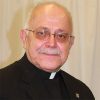A common complaint among a cross sampling of the faithful, from fervent Mass-goers to “lapsed” Catholics, is that they do not feel heard. Recently, Pope Francis has invited all Catholics to participate in a process of synodality, where Catholics talk and leaders listen. The goal is to help bishops, pastors, rectors and theologians understand the struggles, insights, frustrations and religious experiences of a wide spectrum of Catholics, the better to minister to real people living real lives in the real world.
There is no better patron for the synodal process than the saint entrusted with the Resurrection message, who was disbelieved and discounted by the Eleven Apostles.
Mary Magdalene played a pivotal part in the central Christian belief that Jesus Christ rose from the dead. She should know. She talked to him. The Gospels claim she was the very first person to encounter the Risen Christ. The problem was the male disciples were products of a patriarchal society that did not accept the testimony of women.
Worse, the Gospels provide an even more problematic detail: this same woman had once been possessed by no fewer than seven demons until Jesus drove them out (Mark 16:9 and Luke 8:2). Modern psychologists might consider her delusional or even psychotic.
Who would believe such an unlikely and preposterous witness to the Resurrection? Too outrageous and counterproductive to invent, her testimony is included in the Gospels for only one reason: it really happened. And for those brief minutes between encountering the Risen Christ at the empty tomb and delivering her message to disbelieving apostles in the upper room, Mary Magdalene was the Church. She alone bore the spark and fanned to flames the faith of the other apostles.
Over the following centuries theologians and church authorities continued the shameful practice of dismissing or denigrating Mary Magdalene. In 591 Pope Gregory the Great erroneously equated her with the woman taken in adultery, although the Gospels say no such thing.
Modern Scripture scholars point out the misinterpretation, but even today in the popular mind the image of Mary as a reformed prostitute gets reinforced by pop culture in musicals such as Jesus Christ Superstar and Godspell.
It took the Catholic Church almost two thousand years to fully acknowledge and rehabilitate the true role of Mary Magdalene. In 2016, Pope Francis elevated her to the rank of apostle, formalizing her title “Apostle to the Apostles,” and upgraded her memorial on July 22 to a special feast day on a par with the liturgical celebrations of the Twelve. His statement called her a “true and authentic evangelizer.”
The synodal process seeks to address the exclusion felt by so many members of the Church. The story of Mary Magdalene serves as an inspiration. Not only did she support the early Church financially and spiritually, she represents all, laity and clergy alike, who have been ignored, dismissed, diminished, disrespected, or defamed.
With her unwavering witness to the words and Resurrection of Jesus, she represents those at the margins, whose testimony is all the more needed in our time by a damaged Church trying to rekindle the faith and zeal of the apostles.
The first step on the long road to renewal through synodality is to listen to one another.
Featured Image: Mary Magdalene’s encounter with the Risen Christ (John 20:1-18) is depicted in “Christ’s Appearance to Mary Magdalene after the Resurrection” by the Russian painter Alexander Andreyevich Ivanov. (CNS photo/Wikimedia Commons)
![]()

